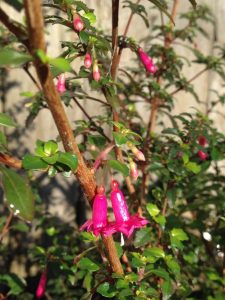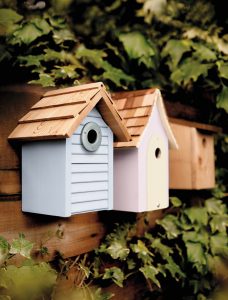Subversive is a strong word, but I am starting to think that it’s time to get a little bit underhand or even revolutionary when it comes to doing my bit to help wildlife and especially the birds and the bees
Before you get concerned, or stop reading, let’s be clear this is a gentle kind of subversive that anyone can do and it’s done with the best of intentions. If everyone did one small thing to support and care for the environment and its wildlife, think how much better the world would be.
Greenhouse activity
The greenhouse is a great place to start. By taking cuttings of plants that provide natural food for wildlife we are supporting the very creatures that perform not just pollination but make up the bottom of the food chain. Those pesky insects that some swat away with little regard about just how precious these buzzing bugs really are. The existence of those creatures hangs in the balance and each and every one of us can make a difference to the outcome. Here’s how. It’s about being generous with your time and gently educating others and filling their gardens with wildlife friendly plants and features. Subversive? Maybe, but it’s a great way to spread the word, plant up barren places and join up some of the wildlife corridors that are broken so that creatures great and small can move from habitat to habitat, feed en route and have plenty of safe, sheltered nesting sites.
Gifts that keep on giving

So box up those cuttings and seedlings and pass them on to anyone with a garden. Run a plant stall at a local event. Sell the plants if you must, just pass them on. People with gardens are not necessarily gardeners and a great many of them just have no idea what to grow or how to do it. Here’s where we come in. Use the gift of plants and help your recipients to plant them properly. Once established each and every one of those plants will help support a variety of creatures.
Choose buddleia, hardy fuchsias and ribes and other flowering plants to support the bees and other pollinators with a rich source of nectar and pollen. Raspberry canes donated from your overgrown raspberry patch will offer fresh, delicious fruit to your chosen recipient but the flowers are rich in nectar and the lost berries and seeds will provide food for the birds. Share seeds and cuttings of your perennial herbs, thyme, sage, rosemary are all fantastic gifts, but they flower too offering rich nectar for all sorts of insects. Even mint, is a fantastic bee magnet, of course it needs planting with caution as it’s a bit of a thug, but if you choose a fantastic variety that can be used for fabulous mint tea and in the kitchen, it’s not such a problem. Let it flower and the bees will be buzzing in your garden all summer long.
Pass it on
Give pots of nectar rich plants to friends that garden. Plant them into pretty pots wrapped in paper and ribbons and pass them on. Teach the recipient how to take cuttings, show the children and pass it on. If every plant you give is then given again and again you are spreading them far and wide and increasing the food sources for wildlife.
Change your gifting practices. Gifts needn’t cost a fortune and anything supporting wildlife in one way or another is not costing the earth either. Look for eco gifts for every recipient, whether its something made from your garden, or something that they can grow in theirs it is making a difference somewhere.

Here are some alternative ideas in plenty of time for Christmas.
- Everyone loves the garden birds. Choose nest boxes, bird feeders and quality bird food for gifts.
- Make your own hampers of suitable products, seeds and more out of wildlife friendly items.
- Offer IOU sessions for the kids to help them make bug hotels, hedgehog houses and more.
- Make a few wildlife memories with the kids. Take them out in search of real life Pokemons that are all around us in nature.
- Consider giving bundles of hedging plants to anyone with a large patch, or even a berry-bearing tree such as rowan, white beam or hawthorn if they have space.
- Buy organic flower bulbs for spring flowers and give them to gardening friends instead of a bottle of wine or chocolates. If the recipient is new to gardening then plant them into a container ready to grow on and give them support and advice.
- Give a membership for a wildlife trust or to a suitable magazine, it’s a great gift for a teenager if they show any interest.
- Take a friend or teenager to a wildlife event or a volunteering day to learn new skills, meet new people and spend time outdoors.
- Give your time. Contact your local school and start a gardening club or a wildlife club and share some of your knowledge and enthusiasm.
- Buy guidebooks and informative books on nature and give them as gifts.










